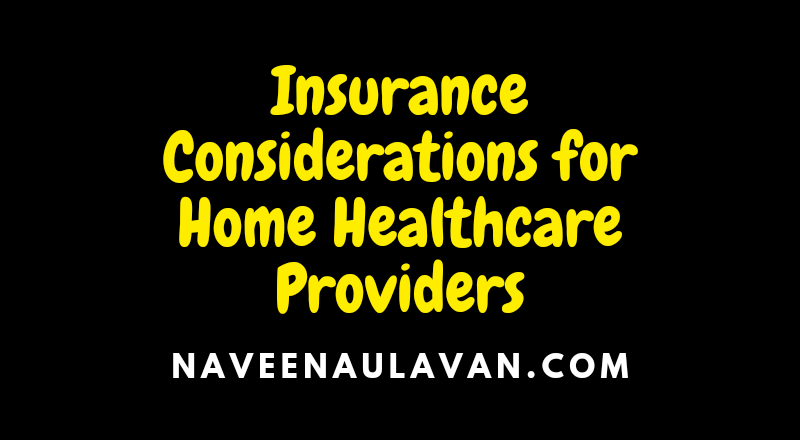Home healthcare providers play a vital role in delivering medical and non-medical services to individuals in the comfort of their own homes. These services can range from skilled nursing care to physical therapy homemaking and personal care assistance. Given the unique nature of home healthcare it is essential for providers to have appropriate insurance coverage to protect themselves their employees and their patients. In this article we will explore the key insurance considerations for home healthcare providers.
1. General Liability Insurance
General liability insurance is a fundamental coverage for any business including home healthcare providers. It protects against third-party claims of bodily injury property damage and personal injury. For home healthcare providers general liability insurance can cover incidents such as slips falls or other accidents that may occur in a patient’s home. It can also provide coverage for allegations of negligence or malpractice.
2. Professional Liability Insurance
Professional liability insurance also known as errors and omissions (E&O) insurance or malpractice insurance is crucial for home healthcare providers. It protects against claims of professional negligence or mistakes made in delivering medical services. As healthcare providers there is always a risk of errors or omissions that could result in harm to patients. Professional liability insurance provides financial protection and can help cover legal defense costs settlements or judgments.
3. Workers’ Compensation Insurance
Workers’ compensation insurance is mandatory in most states and is essential for home healthcare providers with employees. This coverage provides benefits to employees who suffer work-related injuries or illnesses. In the home healthcare setting aides and nurses may encounter hazards such as lifting injuries exposure to infectious diseases or transportation accidents. Workers’ compensation insurance ensures that employees receive medical treatment and wage replacement if they are unable to work due to a work-related injury or illness.
4. Employee Benefits Liability Insurance
Home healthcare providers that offer employee benefits such as health insurance or retirement plans should consider having employee benefits liability insurance. This coverage protects against claims alleging errors or omissions in the administration of employee benefits. Mistakes in enrollment coverage disputes or late filing of paperwork can result in lawsuits. Employee benefits liability insurance provides financial protection for potential legal costs and settlements.
5. Auto Insurance
Since home healthcare providers often travel to and from patient homes auto insurance is critical. Personal auto insurance may not provide adequate coverage especially if the vehicle is primarily used for business purposes. Home healthcare providers should consider a commercial auto insurance policy that covers any accidents or property damage that may occur while using a vehicle for work-related duties. This insurance can also protect against claims arising from accidents caused by an employee while driving a patient to appointments.
6. Cyber Liability Insurance
In today’s digital age home healthcare providers handle sensitive patient information making them vulnerable to cyber risks and data breaches. Cyber liability insurance covers expenses related to data breaches including notification costs to affected individuals credit monitoring services legal fees and potential regulatory fines. It can also provide coverage for lawsuits arising from data breaches or privacy violations. Home healthcare providers should ensure they have adequate cyber liability insurance to mitigate these risks.
7. Property Insurance
Home healthcare providers often have offices or storage facilities where they keep medical equipment supplies and records. Property insurance protects these physical assets against risks such as fire theft or vandalism. It can also cover business interruption losses if the provider’s operations are temporarily halted due to a covered event. Home healthcare providers should carefully evaluate their property insurance coverage to ensure it adequately protects their assets.
8. Umbrella Insurance
Umbrella insurance provides additional liability coverage beyond the limits of primary insurance policies. It acts as a safety net protecting home healthcare providers against large lawsuits that may exceed their general liability professional liability or auto insurance limits. With the potential for high-dollar claims in the healthcare industry umbrella insurance is a valuable coverage option to consider for added protection.
Conclusion
Home healthcare providers face unique risks and having appropriate insurance coverage is essential to protect the business employees and patients. General liability professional liability workers’ compensation employee benefits liability auto insurance cyber liability property insurance and umbrella insurance should be carefully considered to ensure comprehensive coverage. By understanding and addressing these insurance considerations home healthcare providers can minimize their exposure to potential financial losses and focus on providing quality care to their patients.
